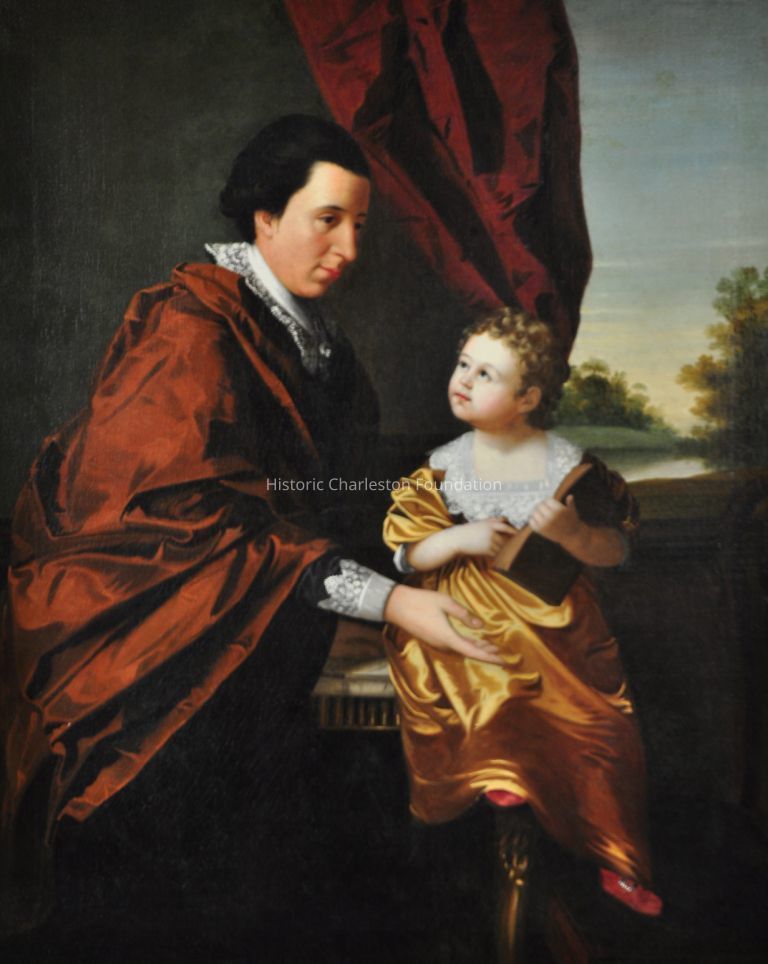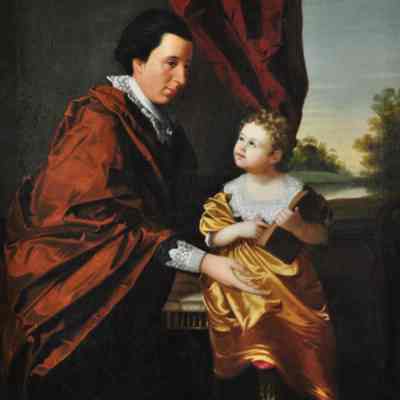Portrait of Man and Child, Thomas Middleton of Crowfield and His Daughter, Mary Middleton Shoolbred
Name/Title
Portrait of Man and Child, Thomas Middleton of Crowfield and His Daughter, Mary Middleton ShoolbredEntry/Object ID
71.6.1Description
Henry Benbridge (American, 1743-1812) Thomas Middleton of Crowfield and his daughter Mary Middleton Shoolbred Charleston, SC ca. 1778 Oil on canvas Portait of Man and Child, Thomas Middleton of Crowfield and his Daughter Mary, c. 1776. Oil on canvas, giltwood frame. Portrait Depicts Man with Cloak, Lace Collar and Cuffs, Standing and Painted At Three-Fourths Length, Right Hand Extended Towards Child. The child is seated on a marble topped, gilded pier table with fluted apron and carved knee. Childs Foot Rests on Queen Anne Style Chair. The Child wears a gold dress with squared neck and lace collar, with red shoes with silver buckles. Child holds an open book in her left hand with right hand pointing to a passage. Wooded landscape in background with water. Center ground of maroon velvet drapery. Composition in style of Van Dyck and relates to portrait of Thomas Middleton by Benjamin West and Arthur Middleton Family group portrait. From exhibit catalog, "Henry Benbridge: Charleston Portrait Painter (1743-1812)" Catalog and Transcription by Angela D. Mack, Research assistance provided by Dianne P. Avalon. pg. 74, number 18. Thomas Middleton of Crowfield and His Daughter Mary, ca. 1776, Oil on canvas, 54 1/2" x 44 1/2" The son of William and Sarah Wilkinson Middleton, Thomas Middleton (d. 1779) acquired Crowfield Plantation and other Carolina estates in 1729, including property in Charleston, two parcels of land on the Santee and Combahee rivers, and Turkey Hill Plantation. His uncle Henry Middleton built Middleton Place and was president of the Continental Congress. His cousin Arthur was a signer of the Declaration of Independence, and his cousin Sarah (cat. 22) married Charles Cotesworth Pinckney (cat. 21). Thoms left for England in 1754 to receive his education and remained there for twenty years before returning to reside chiefly at Crowfield. He held numerous Royal government offices, but supported the Boston Tea Party. Upon his return, he married Mary Gibbes on 17 November 1774. They had a daughter Mary in 1775, who is depicted in the painting. Henry Benbridge (American, 1743-1812) Thomas Middleton of Crowfield and his daughter Mary Middleton Shoolbred Charleston, SC, ca. 1778 Oil on canvas, H. 54 1/4 x W. 45 x D. 2 (framed) inches Historic Charleston Foundation, Charleston, SC, collection purchase. 71.6.1 Like his friend Benjamin West (1738-1820), Henry Benbridge (1744-1812) was one of the first American artists to travel to Italy and sketch in situ the art and antiquities of its ancient cities. Influenced by artists like Anton Raphael Mengs (1728-1779) and Pompeo Batoni (1708-1787), Benbridge returned to America in 1770, poised to satisfy the growing appetite for full portraits in the neoclassical style. In 1773 he arrived in Charleston and immediately found patronage with the city's most notable residents. Benbridge painted Thomas Middleton (ca. 1750-1779) of Crowfield Plantation and his daughter Mary (1775-1816) in fanciful drapery-like dress. The richly colored and deeply shadowed fabrics highlight the faces of father and daughter. While the pose of the sitters is reminiscent of classical compositions, the romanticized landscape in the background attests to European neoclassical tastes fueled by the undercurrents of the Enlightenment. KS and BJOArtwork Details
Medium
Oil, CanvasCollection
Historic Charleston Foundation CollectionAcquisition
Accession
71.6.Source or Donor
Charles H. Drayton and Martha B. DraytonAcquisition Method
PurchasedCredit Line
Descended in Middleton Family of Charleston, From Drayton Hall PlantationMade/Created
Artist
Benbridge, Henry, 1743-1812Date made
1766 - 1786Place
City
CharlestonState/Province
South CarolinaCountry
United States of AmericaLexicon
Nomenclature 4.0
Nomenclature Primary Object Term
PaintingNomenclature Class
ArtNomenclature Category
Category 08: Communication ObjectsLOC Thesaurus for Graphic Materials
Portrait paintingsSearch Terms
Painting, Children and adultsOther Name
PortraitDimensions
Height
50 inWidth
41 inDimension Notes
[height]54.25 __[length] __[width]44.875 __[depth]2.125 __[diameter] __[size] __[other]FRAMEDLocation
Location
Building
NR STAIRHALL FIRST FLOOR LEVELMoved By
June HawkinsDate
June 25, 2002Location
Room
102Building
Nathaniel Russell HouseCategory
PermanentCondition
Overall Condition
FairNotes
Excellent Condition, Conserved July 1981 By Elizabeth Gould of the Corcoran Gallery, Full Condition Report on File, backing board of foam coreOverall Condition
FairNotes
Treatment--Materials Report Oil on canvas: 39.75" x 49.375" (canvas) Photographs taken before laboratory treatment, after relining and cleaning, before inpainting, and after completion of laboratory treatment. Condition: Standard wooden stretcher with one cross-bar, keys present. Original tackover edges removed from all four sides. Glue-lined to coarse burlap. Lining is loose from the painting around all four sides. The painting appears to have been wet from the reverse as water stains are apparent on the lining fabric. Loose on stretcher. Actively flaking with paint losses from flaking overall, particularly apparent in the sky and lower quarter of the painting. Large scratch with paint loss at left side just above man's elbow. Craquelere with some cupping of paint along cracks overall. Heavy mold growth over entire surface of paint layer inside stretcher bars. Discolored retouching in areas of paint loss in the sky, curtain, and darks at bottom. Discolored retouching on man's face and child's face in small areas, probably to cover small stains. Large area of dark retouching in lower folds of man's cloak at bottom left corner. Darkened and discolored overall.Conservation
Treatment
Conservator
Elizabeth J. GouldNotes
Scope of work: Treatment: Placed in closed compartment with 10% thymol in ethyl alcohol fumes to treat mold growth. Mulberry tissue facing applied with wheat paste to protect surface. Removed from stretcher. Lining fabric peeled away in small strips. Residual glue scraped away from reverse of canvas with small scalpel. Infused from the reverse with microcrystalline wax and polyterpene resin using a small tacking iron and cupping to control flow of wax. Lined, face up, to stretched and infused Irish linen on hot table under vacuum pressure and heated to 155 degree F. Cooled under vacuum pressure. Excess wax removed with mineral thinner. Facing tissue removed with water dampened swabs. Painting cleaned with wax emulsion formula and mild detergent in water. Retouching in sky proved too difficult to remove. Retouching in curtain and in darks at bottom removed with ethyl alcohol in xylene. Painting returned to hot table, face up to insure consolidation of the bond. Restretched onto custom-made expansion bolt stretcher with double cross-bar. Lining fabric waxed onto stretcher bars to provide even expansion with opening of bolts. Initial surface coating of polyvinyl acetate type A.Y.A.B. in ethyl alcohol, toluene, and cellosolve acetate applied by air brush. Looses from flaking in curtain, sky, and bottom quarter filled with talc and glue to provide a level surface. Fillings, darkened retouching, cracks, stains and edges inpainted with dry pigments and polyvinyl acetate type A.Y.A.C. Final surface coating of acryloid B-67 in mineral thinner applied by air brush. Surface gloss adjusted with same resinous spray. Protective foam-core attached to the reverse. Returned to frame and secured with brass straps and screws. Expected completion date: 1981-07-06Relationships
Related Person or Organization
Person or Organization
Middleton, ThomasPerson or Organization
Shoolbred, Mary MiddletonPerson or Organization
Drayton, CharlesPerson or Organization
Benbridge, HenryRelated Places
Place
Location
Crowfield PlantationRelated Entries
Notes
58.32.1-12, 94.1.3Related Publications
Notes
Charlestonians Abroad Catalogue P.30 "Henry Benbridge, 1743-1812, Charleston Portrait Painter" with essays by Maurie McInnis... [et al. ]; curated by Angela D. Mack. Charleston, SC: Gibbes Museum of Art/Carolina Art Association, 2000. Exhibit catalog 18, p. 74Provenance
Notes
Collected By: Charles Drayton and Martha B. Drayton From (book): Museum of Early Southern Decorative Arts. "The regional arts of the early South: a sampling from the collection of the Museum of Early Southern Decorative Arts"/John Bivins and Forsyth Alexader. Copyright 1991 by Old Salem. (similar painting p.97): Henry Benbridge was born in Philadelphia in 1743 and was educated by his stepfather Thomas Gordon. He may have been instructed by John Wollaston, who painted Gordon's portrait, for som of Benbridge's early portraits reflect Wollaston's style; he may also have briefly trained under Matthew Pratt. By 1765 Benbridge was studying in Rome with Pompeo Battoni and perhaps Anton Mengs; before that period, he is thought to have spent a short time in London under the tutalage of Benjamin West, who referred him to Battoni and Mengs. Benbridge returned to America in the 1770s, and in 1772 he moved to Charleston. Except for a two-year absence in the 1780's, he remained in Charleston painting and teaching--Thomas Coram was one of his students--until the 1790s, when he moved to Norfolk. He died on 25 january 1813 and was buried at Christ Church in Philadelphia. Benbridge's Italian training is the continental and Neoclassical styles in reflected in his later portraits. He favored colors such as brillant yellow gold, deep rich reds, and the rich blue of this portrait. He often painted his subjects in outdoor settings iwth classical columns, parklike vistas, and ornamental foliage. He used glazes, another Italian technique' the delicate coloring of Mrs. Allston's forehead, throat, and hand were created in this manner. Benbridge was also drawn to the conversational form of portraiture. Benbridge's conversational portraiture made fashionable in Engalnd by Arthur Devis and John Zoffany, usually portrayed group subjects, either families or friends, in indoor or outdoor settings relating to the group in some way and in attitudes suggesting that the subjects were conversing. In general, the artist paid great attention ot the foreground and background detail, as well as forms and modes of dress. Although this form of painting was widely espoused in England, Benridge and his friend Charles Willson Peale were the only artists working in the South to try their hands at it.Exhibitions
10
16

